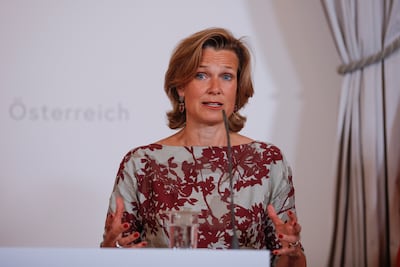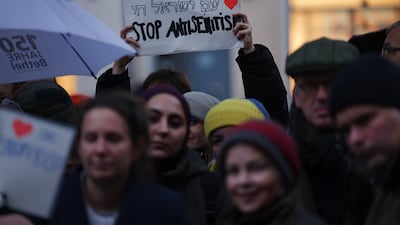The European Union’s coordinator on anti-Semitism has called on EU countries to have “zero tolerance” for hate speech after anti-Jewish attacks soared following the escalation in the conflict between Israel and Hamas.
“We were not naive enough to think anti-Semitism was gone” from European society, Katharina von Schnurbein told The National. “We have seen the proliferation of anti-Semitism whenever there is a crisis, including during the [Covid-19] pandemic.”
The European Union’s coordinator on anti-Semitism has called on EU countries to have “zero tolerance” for hate speech as theybb struggle to contain a spike in anti-Jewish attacks following tnionon
Recent examples of anti-Jewish acts include reports of a mob protesting against Israel at a synagogue in the Spanish enclave of Melilla in North Africa and a firebomb assault on a synagogue in Berlin.
No one was hurt in the attacks, but many Jews across Europe are adopting a low-profile, saying they fear being targeted physically.
Buildings inhabited by Jews in the German capital have also had the star of David painted on their doors and walls.
Speaking less than a week after Hamas launched an unprecedented attack against Israel on October 7 that killed more than 1,400 people, France’s Interior Minister said anti-Semitic acts across the country had soared to reach “more than 100” in a few days.
Israel responded to the Hamas attack with a siege and intense shelling of the Gaza strip which has killed more than 4,100 Palestinians.
The European Commission, the EU’s executive arm, launched its first-ever strategy to combat anti-Semitism in 2021. It runs until 2030.
The bloc's 27 countries in March 2022 committed to adopt their own national strategies. These are policy proposals and not legally binding documents. So far, this has been done by 11 member states.
At the time of the strategy’s launch in 2021, the Commission allocated €24 million for member states to better protect public spaces and places of worship.
The Commission is currently funding a €1 million project to address anti-Semitism through education in 12 EU countries, in co-operation with Unesco. It also aims to strengthen Jewish civil society.
“We see change is happening, but we also have to be aware that this strategy was adopted only two years ago,” said Ms von Schnurbein, who was appointed in 2015 as the first European Commission Coordinator on combating anti-Semitism.
“It will take time to really create change. We have to be realistic,” she said in a phone interview.
Fighting anti-Semitism in Europe is highly sensitive given the destruction of Europe's Jewish population in the Second World War and divisions within European countries over relations with Israel.
It is also high on the list of priorities for the Commission’s president Ursula von der Leyen.
In a speech to the European Parliament this week, she highlighted the importance of the EU’s Digital Services Act in fighting hate speech online and the recent investigation launched by the Commission in relation to X, Meta and TikTok.
“Synagogues have been vandalised. Hate speech and fake news are spreading at worrying speed. And this is something that we simply cannot accept,” she said. “It is our shared responsibility to make sure that our dark past does not return. We have to protect Jewish life in Europe.”
The Commission on Thursday gave Meta and TikTok one week to provide details on measures taken to counter the spread of terrorist, violent content and hate speech on their platforms, one week after Elon Musk's X was told to do the same.
Critics of the Commission’s strategy on anti-Semitism say that it relies too much on the International Holocaust Remembrance Alliance (IHRA) definition, which is closely linked to criticism of Israel.

They say the Commission does not do enough to recognise Palestinian victimhood, thus further fuelling polarisation.
The Commission rejects such criticism and says its strategy reflects the wishes and fears of Europe’s Jewish community.
The IHRA definition must continue being applied in Europe to recognise all forms of anti-Semitism, including Israel-related anti-Semitism, said Ms von Schnurbein.
“Not everything in the IHRA definition is automatically illegal,” she said.
“The IHRA definition itself states [that] whether an anti-Semitic incident is illegal is defined by law.”
Context is key when applying the IHRA definition, according to Ms von Schnurbein.
“Free Palestine” graffiti on a bridge is not the same as the same words drawn on a synagogue, in which case it collectively holds Jews in Europe responsible for what is happening in Israel, she said.
“When you stand with someone, it does not give the other the right to commit hate crimes.”


